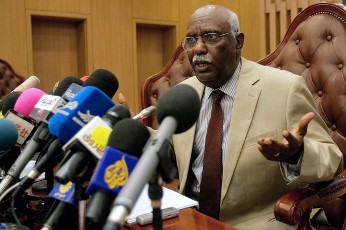Sudan to take advantage of loophoples in US sanctions regulations
August 28, 2013 (KHARTOUM) – Sudan’s foreign ministry undersecretary, Rahmatallah Mohamed Osman, has said that US economic sanctions on Sudan contain some loopholes which could be exploited to boost the economy.
 Osman mentioned Iran as an example of a country which took advantage of some aspects in its relations with the US in spite of the long history of sanctions and animosity.
Osman mentioned Iran as an example of a country which took advantage of some aspects in its relations with the US in spite of the long history of sanctions and animosity.
Sudan has been under the US blacklist of states sponsoring terrorism since 1993 on allegations of harboring Islamist militants despite reports of Sudan being a cooperative intelligence partner of Washington in the “war on terror”.
Sudan is also subject to comprehensive economic sanctions since 1997 over terrorism charges as well as human right abuses. Further sanctions, particularly on weapons, have been imposed since the 2003 outbreak of violence in the western Darfur region.
Osman, who was speaking at a seminar on the impact of the US sanctions on Sudan on Wednesday, said that US officials always insist that Khartoum did not ask them to cooperate in the areas where there are possible opportunities.
He pointed that several Sudanese corporations including Kenana Sugar Company (KSC) and Sudatel Telecom Group (STG) managed to break the sanctions and engaged in direct business relations with US companies and businessmen, adding that the US misses out on some opportunities as a result of those sanctions.
The director of the US department at Sudan’s foreign ministry, Mohamed Abdelaziz Al-Tom, said that the US sanctions have slowed the economic growth and hampered government access to external loans and foreign debt exemption and pointed to the difficulty of lifting it, since that it was authorized by the congress in the form of laws.
Al-Tom also said that US companies refrained from investing in Sudan although there were some exceptions regarding agricultural and medical exports, pointing that sanctions don’t apply to areas of displacement within the Sudanese territory.
The chairman of the board of directors of the Gum Arabic Company (GAC), Taj Al-Sir Mustafa, said that sanctions have negatively impacted financial transfers for GAC, pointing that the US sanctions led to curbing Sudan’s gum exports due to smuggling, and encouraged its production in neighboring countries as well as seeking alternatives.
The director of KSC, Al-Amin Al-Kareb, said that his company managed to hire an American irrigation company through the US Office of Foreign Assets Control (OFAC) which is the government agency that administers and enforces economic and trade sanctions.
He claimed that there are certain bodies and businessmen who contacted OFAC to report on US banned commodities in the Sudanese markets, saying that a giant private company operating in Sudan has incurred huge financial loss as a result of that.
(ST)
